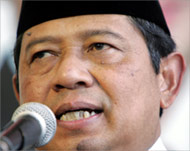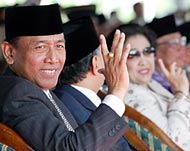Ex-minister catches Indonesia’s fancy
Voters across Indonesia’s roughly 6,000 inhabited islands are gearing up for the first round of presidential elections to be held on 5 July.

These are the first direct presidential elections in the nation’s 59-year history, a product of the ongoing process of electoral and legislative reform in the third most populous democracy on the planet.
Yet most Indonesians have no illusions about their future.
Take Suparno, a native of Sengon in Java, the largest island in the Indonesian archipelago. He is wearing the distinctive yellow T-shirt of Golkar – Indonesia’s long-time ruling party – like a balaclava against the fierce noonday heat. But he has little time for the promises the presidential candidates are offering this election year.
“It makes no difference what he says because I know that the day after the election I will be back working in the fields,” says Suparno, who earns roughly $2 for a 12-hour day working a wealthy local landowner’s fields.
“But I have a newly born son, only two days old. It is important that I make the right choice for the right candidate because he will shape the future for both my sons.”
Complex process
The Indonesian general elections of 2004 have been described as the longest and most complicated in the history of democracy. On 5 April, 84 percent of the nation’s 147 million eligible voters queued up at 587,000 polling stations where they scanned up to four newspaper-sized ballots to select roughly 16,000 candidates (from a total of 450,000) to fill seats in the national parliament and provincial and local councils.
Were none of the five presidential candidates in next week’s ballot to secure the required “50 per cent plus one” majority, a second run-off election will be held between the two leading candidates in late September.
 |
|
Ex-minister Yudhoyono appears |
However, chances of a potentially divisive second round – considered a sure bet just a month ago – are fading in the face of the meteoric rise in popularity of candidate Susilo Bambang Yudhoyono, known everywhere by his initials, SBY.
Credible polling shows Yudhoyono with more than 45 percent of the decided vote. The incumbent president, Megawati Sukarnoputri, former armed forces chief Wiranto and deputy house speaker Amien Rais are all running a shade over or under 10 percent.
Sukarnoputri’s former vice-president Hamzah Haz’s support lags well behind the front-runners at less than three percent.
Most popular
Appointed security minister by consecutive post-Suharto presidents over the past four years, Yudhoyono, 54, is no political neophyte.
But by eschewing a partnership with one of the establishment parties to run in April under the banner of the newly formed Democratic Party, he cut himself off from potentially lucrative sources of campaign financing and the logistical support of the “party machines”.
|
“It is clear Indonesians Bantarto Bandoro, |
It doesn’t seem to have made a difference. “It’s a typical mistake that has been made in many emerging democracies where the traditional elite believe the average voters are too stupid to deal with complicated issues,” says Paul Rowland of the National Democratic Institute for International Affairs.
Although polls as far back as last July rated Yudhoyono the most popular politician in the country, his personal popularity has accelerated since he resigned from the cabinet in March.
With less than a week to go, analysts are sifting through the results of April’s legislative elections for a hint of what is to come.
The Indonesian electorate – reacting to persistent corruption, high unemployment and mounting prices for staple goods – delivered a punishing rebuke of Sukarnoputri for what is seen by many as her aloof and ineffective rule.
Wasted capital
“If we follow the trends of the legislative elections, where the
undecided voters went to the candidates from the new parties, then SBY will get through in the first round,” said Alan Wall of the International Foundation for Electoral Systems, and a long-time resident of Indonesia.
 |
|
Sukarnoputri’s ineffective rule |
The daughter of Indonesia’s charismatic founding president and the people’s choice for president in 1999, Sukarnoputri was relegated to the vice-presidency by a powerful cabal of clerics and politicians.
She assumed the presidency following the July 2001 impeachment of populist cleric Abdurrahman Wahid, but like her predecessor has wasted the enormous political capital she had accrued as a figure publicly opposed to Suharto’s iron-fisted rule.
In April support for her ruling Indonesian Democratic Party of Struggle dropped by one-third, with many voters turning to Yudhoyono’s upstart Democratic Party which rose from obscurity to garner more than eight percent of the vote.
“I think it is clear the Indonesian people have become more politically mature and that is shown by what happened in the legislative elections,” said Bantarto Bandoro from the Centre for Strategic and International Studies in Jakarta.
“They’ve shown their unhappiness with certain candidates, certain parties failure to improve their situations and they have acted to remove them.”
Skin-tight pants
News of that political evolution does not appear to have reached the ears of the political elite. With the exception of deputy house speaker Rais, the presidential candidates have steered clear of issues and substantive policy debate.
 |
|
Most candidates have avoided |
Instead, supporters are fed a steady diet of nationalistic platitudes at well-managed stadium events, where they are entertained by karaoke-singing presidential contenders and gyrating female “entertainers” in skin-tight nylon pants.
However, even in the heartland of East Java, the area known as The Land of 1,000 Pesantren (religious boarding schools), where he is fighting a presidential race that is long on personality and short on substance, the normally taciturn Yudhoyono can do no wrong.
“I like him because he doesn’t say anything,” said Suparno, the cane cutter from Sengon whose choice of candidates seems to be shared by a majority of voters in his town of 25,000. “He is serious and seems to listen to what the people are saying. All of the men in these fields will vote for him.”